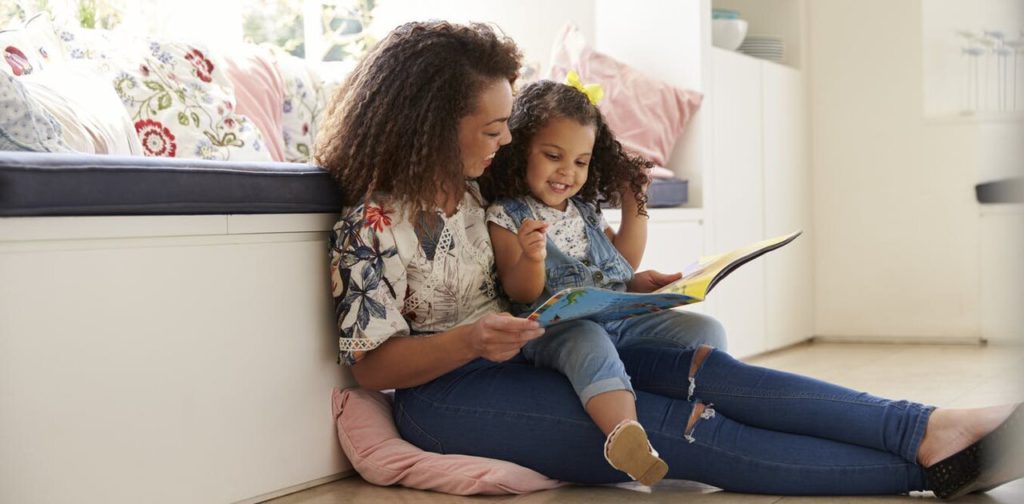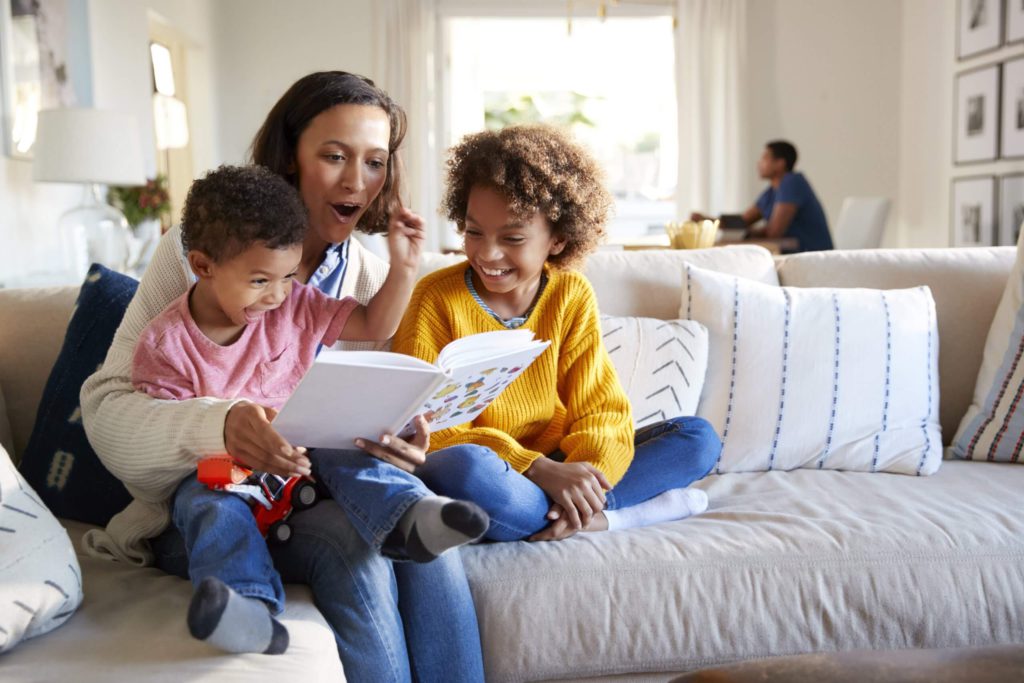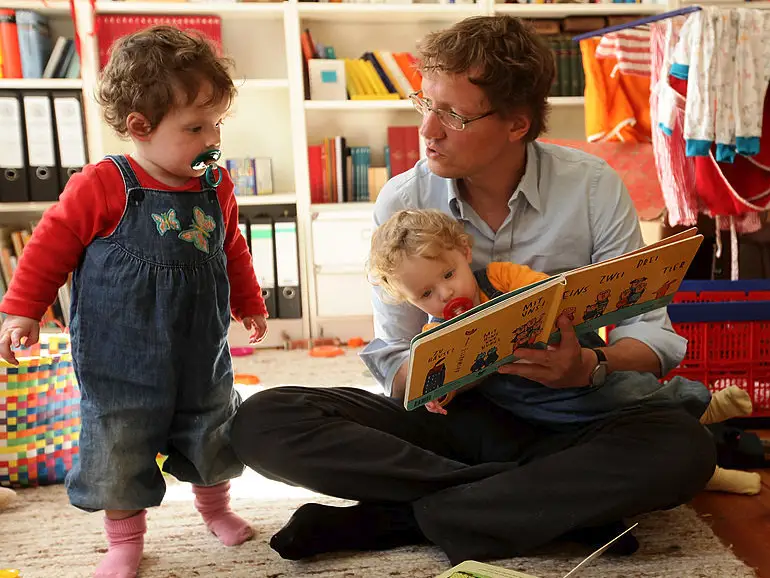We all want our children to be successful in life, and one of the best ways to help them achieve this is to encourage them to develop reading habits at home. Reading opens worlds of opportunity for children and helps to foster a lifelong habit (and love) of learning.
Looking for classroom activities and lesson ideas? Here’s some for Bill Martin Jr’s Brown bear, brown bear, what do you see?

Importance of reading habits at home
They are few things as powerful as devoting time to reading with a young child. It is incredibly beneficial for their confidence, happiness, cognitive development, security and even relaxation!
Shockingly, 55% of 0-2-year-olds are not read to every day by their parents (National Literacy Trust, 2020).
Yet, reading enjoyment has been reported as more important for children’s educational success than their family’s socio-economic status (OECD, 2002).
So, what is holding parents back from reading with their children at home?

Barriers to reading at home with children
In a recent survey by the National Literacy Trust, 43% of parents said they did not read enough with their children because life is too busy. Other reasons included: “I don’t know what sort of stories my child likes reading” and “finding time in our family routine to fit in regular story times together.”
Other barriers include financial issues, language, or literacy problems themselves (as reported by parents who have struggled with education), social isolation, lack of access to books at home and lack of support from partners/other carers.
So how can we help overcome these barriers?
Create good reading habits
Good reading habits at home can be life-changing. Children who read for pleasure are more likely to do well at school, are less likely to get into trouble with the police and have better mental health and wellbeing than those who don’t (National Literacy Trust, 2020).
It is also important for parents to model good reading habits in front of children. By showing your child that you enjoy reading yourself, they will see it as a normal part of life and feel inspired by your example.
In addition to this, we must remember that life doesn’t always plan out how we want it to! Getting comfortable with reading together every single evening may prove challenging if family life is hectic or unpredictable.
Reading for pleasure is an exceptionally powerful habit for your child to develop. Like all habits, it needs consistency and repetition to properly embed itself in children’s lives.
What impact does reading have on children?
For children, the habit of reading can create life-long benefits. These include:
• Developing a life-long love of learning
• Improved vocabulary and literacy skills (being able to read with confidence)
• Opening their imaginations up to possibility and creativity by exposing them to new ideas, people, and places through stories
• Improving life chances at school and beyond (better grades, better jobs etc.)
• Improved mental health & wellbeing – being able to switch off from technology by going on an adventure in a book is incredibly helpful for young minds! It allows your child’s mind to relax after a busy day or week at school
Why are some children reluctant to read?
Some children dislike reading because it is associated with schoolwork, which can be perceived as a stressful or unpleasant activity.
They may also associate reading with being hard work if they struggle to read the words themselves without help. This can lead to them avoiding it overall, which will only make their life more challenging in the long run!
Although, there may be a genuine underlying cause for children to dislike reading. This could be due to a visual or auditory problem or dyslexia.
It’s important to remember that any of these barriers are not completely limiting when it comes to children’s reading development. With the right support, all children can and will learn to love reading!
Having said that, if you do have concerns, raise these with a teacher or professional.

Signs a child may find reading difficult:
- They read slowly and make lots of mistakes when reading aloud in class or at home
- They lack confidence with their reading, even though they understand the meaning behind what they are saying.
- Their handwriting is difficult to decipher (this can be a sign of dyslexia too)
- They avoid reading or being read to, especially fiction texts
- Finds it difficult to blend sounds
- Has difficulty in establishing syllable division or knowing the beginnings and endings of words.
- Unusual pronunciation of words
- Delayed speech
- Difficulty with rhyming words
What should you do if you think a child is having trouble with reading?
Firstly, speak to your child’s teacher(s) about any concerns you may have. If they don’t know how to help, then go directly to a professional (GP/health visitor or paediatrician) who can assess for potential learning difficulties such as dyslexia and direct accordingly if required.
Teachers are also trained in helping children with additional needs, so be sure not to worry! Get the right support in place where necessary and a life-long love of reading will develop over time!
Best books to read at home:
The best books to read at home with children are those that capture their imagination, introduce new ideas and worlds, and make them laugh!
Ultimately, the books must be completely tailored to the child’s interests, ability, age, and hobbies.
As children develop, the books they read will change and grow with them.
Children’s interests are diverse and can include things like sport, animals, and music…so always tailor your book choices to their individual needs!
Some favourites include The Cat in the Hat by Dr Seuss, Charlie and the Chocolate Factory by Roald Dahl, Where the Wild Things Are by Maurice Sendak and Make Way for Ducklings by Robert McCloskey and anything from Julia Donaldson (author of Gruffalo)!
Reading out loud is a great way to bond with your child over stories and encourage fluency in reading aloud. It can be especially helpful if you’re facing any challenges getting your child into independent reading habits.
The path a child takes in reading
Every child is different, but parents must understand how crucial life-long reading habits are for developing minds. By providing a lifetime of learning opportunities through books – starting from birth – you’ll be encouraging lifelong literacy skills which will serve as a platform for all future success!

0-18 months:
Babies love hearing sounds so pick up any type of book and explore the pictures, sounds and colours with them.
18–36 months:
At this stage, children are starting to develop their language skills. Here they will love hearing stories read aloud that feature rhyming words and simple text. This is a crucial time for the life-long development of literacy skills!
36 – 60 months:
By now your child should be able to enjoy books independently or with minimal help from you. They will also be developing an understanding of concepts like the alphabet, which means it’s important for them to know what letters look like as well as how they sound when spoken aloud!
How to promote home time reading:
- Make time every day for reading together. Even if it’s just for 15 minutes, this will help to create a daily habit that will be beneficial in the long run.
- Have a variety of books on hand that will interest your child. This could include picture books, storybooks, chapter books and magazines. Be sure to change up the selection often so they don’t get bored!
- Get involved with what your child is reading. Ask them questions about the characters and plot and discuss what they think might happen next. This helps to develop their comprehension skills and encourages critical
- Explore different genres and authors to find out what your child enjoys reading.
- Let your child see you reading for pleasure too! This will help normalise the habit of reading and set a good example.
- Try not to get discouraged if your child doesn’t seem interested in books straight away – be patient and keep trying different things until they find something that captures their attention.
- Make it always an option and easy to do! This means no barriers like time, money or needing extra help from someone else – just pick up a book whenever you feel like it! You’ll find that life will magically fit around this habit once established
Above all, have fun together as a family while developing life-long skills!

